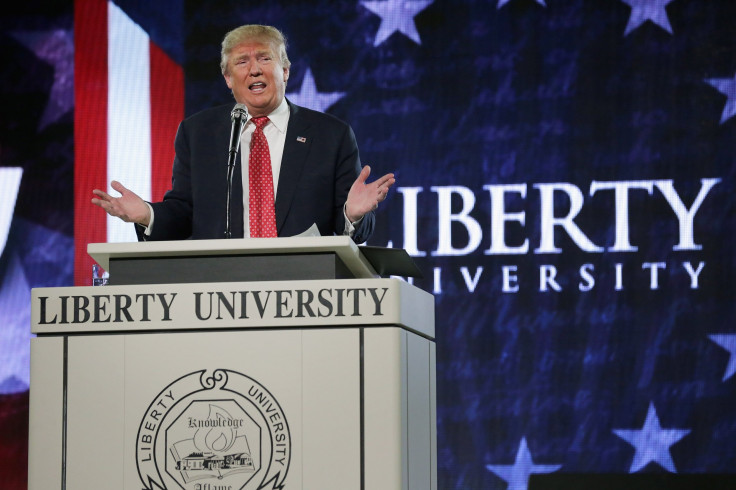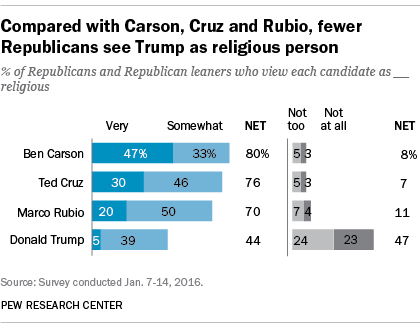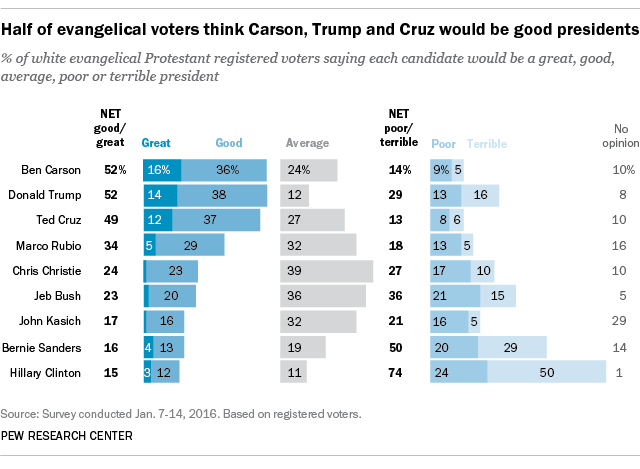Why Do Evangelical Christians Love Donald Trump? Outsider Candidate Fires Up Voters Who Are Tired Of Losing

With the Iowa caucus less than a week away, Donald Trump received a virtual benediction Tuesday when Liberty University President Jerry Falwell Jr. endorsed his bid for the White House. Given that the brash New York billionaire can barely recite a Bible verse, a glowing validation from the son of a famous televangelist may seem puzzling on its face. But Falwell is by no means the only evangelical Christian to throw his weight behind the disruptive real estate mogul: An NBC News/Survey Monkey poll released Tuesday shows the thrice-married Presbyterian has earned the support of more than a third of white evangelical Republican voters nationwide. Meanwhile, Texas Sen. Ted Cruz, whose father was a pastor and who can boast a list of religious bona fides, currently claims just 20 percent of the nationwide evangelical vote.
It’s an apparent paradox that has many in political and religious circles baffled.
“Donald Trump is certainly not evangelical and it’s not clear that he’s a very devout Christian at all,” said Geoffrey Layman, a political science professor at Notre Dame. “Culturally, he says he’s pro-life and against same-sex marriage, but his position on those issues in the past has been inconsistent — and they’re not an emphasis of his campaign. So you wouldn’t think he’d be particularly attractive to the evangelical base. But to some, he is.”
Evangelical Christians practice a form of Protestantism that emphasizes a relatively literal interpretation of the Bible and the importance of being "born again," without a need for sacraments like baptism. According to Pew Research, they make up about a quarter of all Christians in the United States.
So how did the foul-mouthed, philandering Trump — whose public statements frequently betray his ignorance of Christianity — become a savior for so many on the evangelical Christian right? The answer is simple: They’ve been let down too many times in the past, both by establishment Republicans and evangelical candidates with no real shot at winning. And they’re tired of losing.

“In either scenario, they end up hugely disappointed,” said Mark Rozell, the acting dean and professor at the George Mason University School of Policy, Government and International Affairs. “Along comes Trump. Sure, he's not one of them, but more importantly he is not of the political establishment or even a mainstream Republican. He disdains both.”
In that context, Rozell said, support for Trump makes a kind of sense. For decades, religious conservatives have backed two types of candidates: other evangelical Christians like Pat Robertson or Mike Huckabee, or establishment Republicans like George W. Bush. But neither type has produced the results they want. Evangelical candidates never manage to win and establishment Republicans in office seem to only pay lip service to the issues evangelicals care about.
“They think Trump is sincere when he says what he will do for them,” Rozell said. “Doesn't matter his past marriages or whether he can speak correctly about the Bible. He can win, he will deliver what he promises. That's more than they've ever got from any other candidate they backed for president.”
For many right-wing conservatives, including evangelical Christians, the promise of a Trump presidency is the promise of a restoration of America’s greatness, and a return to the values they prize. A Pew Research survey released Wednesday bears that out: 52 percent of white evangelical Protestant voters think Trump would make a “good” or a “great” president.

And of course Trump is a political outsider who appeals to some evangelical Christians’ disdain of the political establishment, a seemingly liberal media that mocks their faith and a toxic notion of “political correctness” that has swept popular culture. Trump’s bold dismissal of what he deems a P.C. culture gone amok resonates with many voters who’ve felt alienated and marginalized by a changing world that seems to be drifting further and further from their values.
“Trump has been labeled as intolerant and a bigot, but he doesn’t care,” said Layman. “He has a willingness to say what a lot of people really think, but are afraid to talk about because they’ll be labeled as racist or bigots. He makes it OK to express these things. They like him because he’s trying to stick it to the mainstream liberal elite, the media and political correctness — all of which they’ve abhorred for years and years.”
And even though his campaign hasn’t necessarily emphasized traditionally important evangelical issues like same-sex marriage or abortion, Trump has tapped into the big fears that many evangelicals are feeling right now, says Marie Griffith, director of the Danforth Center on Religion and Politics at Washington University in St. Louis. His emphasis on immigration, the economy and even issues like guns are larger trigger points in this election.
Layman adds that Trump has been the leader among GOP candidates to embody an aversion toward Muslims and other immigrants — two groups that represent a big threat to the evangelical crowd.
“There’s a lot of antipathy among evangelicals toward Muslims. And I think evangelicals tend to be, as a whole, pretty anti-immigrant. Those are the two issues that Trump has become the poster boy for,” said Layman. “Candidates like Cruz and Rubio have followed Trump on the Muslim issue, but it’s clear he’s the leader.”
Of course, not everyone on the Christian right is enamored with Trump. John Stemberger, president of the Florida Family Policy Council, decried Falwell’s endorsement.
“The late Dr. Jerry Falwell Sr. would be rolling over in his grave if he knew the son who bore his name had endorsed the most immoral and ungodly man to ever run for President of the United States,” Stemberger told Politico.
And while Trump has more evangelical support nationwide than rival Ted Cruz, a Quinnipiac University Poll released Wednesday showed that Cruz has the support of 39 percent of self-described Republican evangelical voters in Iowa, while Trump trails with 27 percent. That could be a result of a key endorsement from Bob Vander Plaats, a leading evangelical leader in Iowa who founded influential conservative nonprofit The Family Leader.
“Iowa evangelical voters are looking at the candidates that align with their values,” said Drew Zahn, communications director of the Iowa-based Family Leader, a conservative political organization. “But there is a pro-outsider sentiment nationwide and here in Iowa, which has led to the rise of someone like Donald Trump.”
And the result in Iowa, where 36 percent of Republican voters are evangelical Christians, is what could turn the tide against Trump.
“Trump, for all his flaws, exudes success. That, and his willingness to take it to the establishment, the liberal media and even other candidates is attractive to evangelicals as much as any other Republican,” said Layman. “But if Trump were to lose in Iowa and New Hampshire, I think the evangelicals would be the first to jump off the bandwagon, because he’s not a natural fit.”
An earlier version of this article incorrectly listed Mark Rozell as an acting dean and professor at Georgetown University. He is acting dean at George Mason University School of Policy, Government and International Affairs. We regret the error.
© Copyright IBTimes 2025. All rights reserved.





















